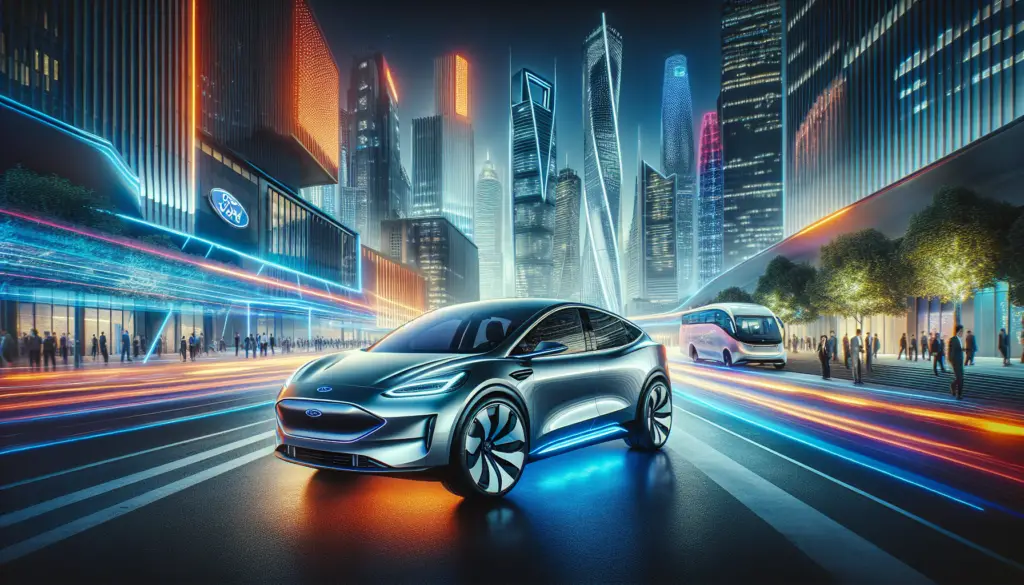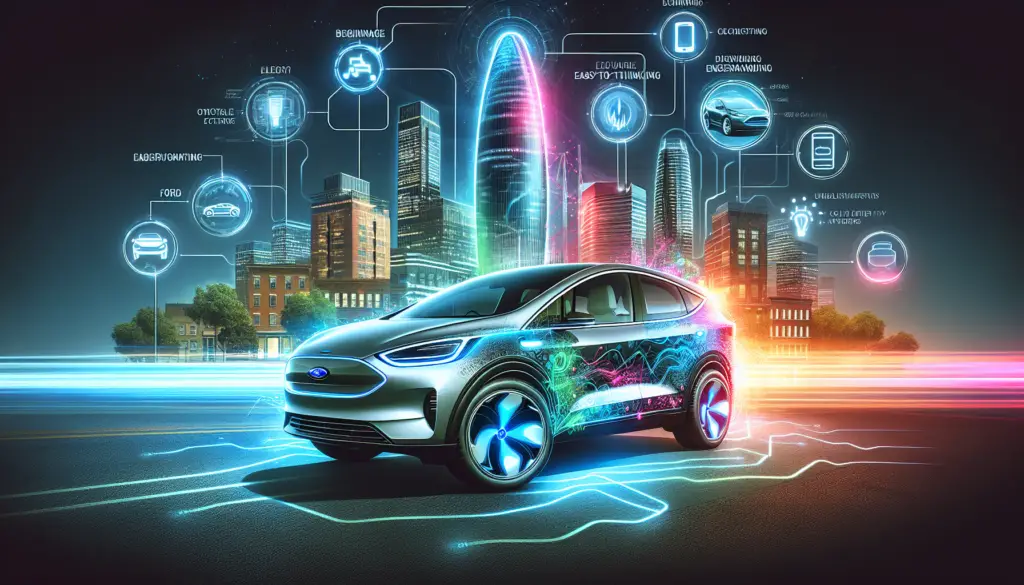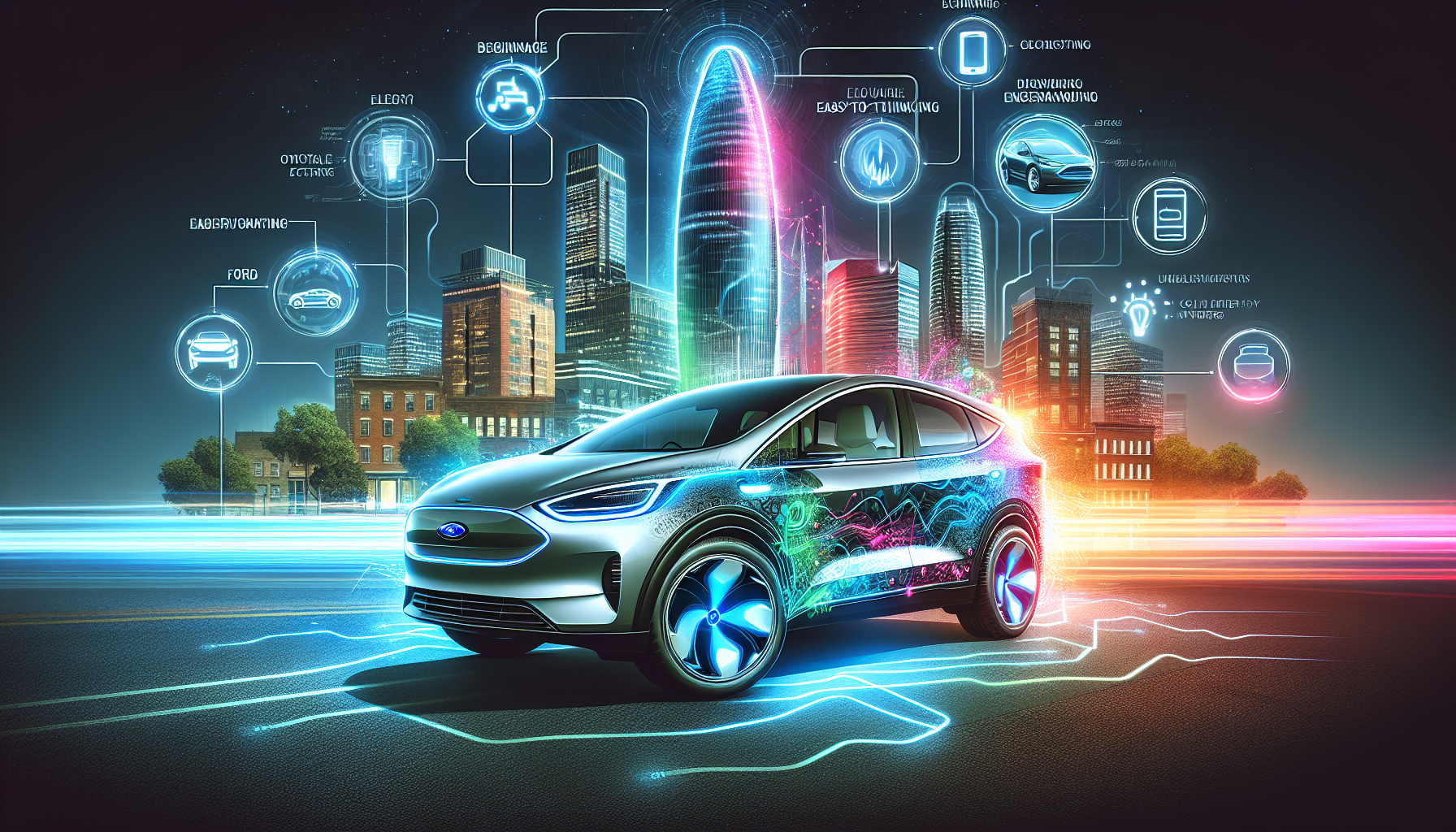Have you ever wondered what goes on under the hood of an electric vehicle? Are you curious about how Ford is leading the charge in developing cutting-edge electric vehicle technology? Look no further, because this article is the perfect beginner’s guide to understanding Ford’s electric vehicle technology. From the basics of how electric vehicles work to the innovative features that make Ford’s electric vehicles stand out, you’ll gain a clear understanding of this eco-friendly and high-performance technology. So strap in and get ready to embark on an electrifying journey!

What is Ford Electric Vehicle Technology?
Ford Electric Vehicle Technology refers to the innovative and cutting-edge technology developed by Ford Motor Company to power their electric vehicles. This technology aims to provide an eco-friendly and efficient mode of transportation by harnessing the power of electricity instead of relying on traditional gasoline engines. Ford’s electric vehicles are designed to deliver high performance, increased energy efficiency, and reduced emissions, while still offering the same level of comfort and convenience that drivers expect from a Ford vehicle.
Advantages of Ford Electric Vehicles
Reduced Emissions
One of the key advantages of Ford Electric Vehicles is their significant reduction in emissions. Unlike traditional gasoline-powered vehicles, electric vehicles do not emit any tailpipe pollutants. By opting for an electric vehicle, you are actively contributing to the reduction of greenhouse gas emissions and helping to combat climate change. Additionally, electric vehicles produce zero emissions at the point of use, which means cleaner air quality for you and your community.
Lower Operating Costs
Ford Electric Vehicles offer lower operating costs compared to gasoline-powered vehicles. Electric vehicles generally have fewer moving parts, which means lower maintenance and repair costs over time. Moreover, the cost of electricity is significantly lower than gasoline, resulting in cheaper fueling costs. With increasing fuel prices, opting for an electric vehicle can help you save a substantial amount of money in the long run.
Improved Performance
Electric vehicles offer an exhilarating and smooth driving experience due to their instant torque delivery. Ford Electric Vehicles are designed to provide quick acceleration and seamless power delivery, ensuring a thrilling ride every time you get behind the wheel. Additionally, the lower center of gravity, thanks to the placement of the battery pack, enhances the vehicle’s stability and handling, making for a more enjoyable and confident drive.
Increased Energy Efficiency
Ford Electric Vehicles are highly energy-efficient, converting a higher percentage of electrical energy from the battery to power the wheels, compared to gasoline-powered vehicles that waste a significant amount of energy as heat. This energy efficiency results in a longer driving range for electric vehicles, allowing you to travel more miles on a single charge. Ford is continually enhancing the energy efficiency of their electric vehicles to provide you with the best possible driving experience.
Different Types of Ford Electric Vehicles
Ford offers a diverse range of electric vehicles to suit different preferences and driving habits. Whether you are looking for a fully electric vehicle, a plug-in hybrid electric vehicle (PHEV), or a self-charging hybrid electric vehicle, Ford has options to meet your needs.
Fully Electric Vehicles
Fully electric vehicles, also known as battery electric vehicles (BEVs), are powered solely by electricity and do not require any gasoline. These vehicles rely entirely on the electric motor and use a large battery pack to store electrical energy. Ford offers fully electric vehicles, such as the Mustang Mach-E, which provide emission-free driving and a range that suits the needs of most drivers.
Plug-In Hybrid Electric Vehicles (PHEVs)
Plug-in hybrid electric vehicles (PHEVs) combine an electric motor with a gasoline engine. These vehicles can be charged using an external power source and also have a gasoline engine that acts as a backup. PHEVs offer the flexibility of driving on electric power for shorter distances and switching to gasoline for longer trips. Ford offers PHEVs like the Ford Escape Plug-In Hybrid, which provides the best of both worlds – electric power for efficiency and gasoline power for extended range.
Self-Charging Hybrid Electric Vehicles
Self-charging hybrid electric vehicles, also known as non-plug-in hybrids, generate electricity through regenerative braking and the gasoline engine. These vehicles do not require external charging since the battery is continuously charged while driving. Ford’s self-charging hybrid electric vehicles, such as the Ford Fusion Hybrid, offer improved fuel efficiency by utilizing the electric motor alongside the gasoline engine.
Understanding Battery Technology
Batteries play a crucial role in powering electric vehicles. Ford utilizes advanced battery technology to deliver impressive performance and reliability in their electric vehicles. Understanding the basics of battery technology is key to comprehending the capabilities of Ford electric vehicles.
Lithium-Ion Batteries
Most Ford electric vehicles utilize lithium-ion batteries, known for their high energy density and long lifespan. These batteries store electrical energy and provide power to the electric motor. Lithium-ion batteries are lightweight, durable, and can be recharged numerous times before their performance starts to degrade. Ford incorporates state-of-the-art lithium-ion battery technology to ensure optimal performance and longevity for their electric vehicles.
Battery Capacity and Range
The capacity of an electric vehicle’s battery determines its range, the distance it can travel on a single charge. Ford electric vehicles are designed with varying battery capacities to accommodate different driving needs. A larger battery capacity generally translates to a longer driving range. It is essential to consider your typical driving patterns when selecting an electric vehicle to ensure it meets your range requirements.
Battery Charging
Charging an electric vehicle is a straightforward process that can be done at home or at public charging stations. Ford electric vehicles come equipped with a charging port that allows you to connect to a power source. The charging speed depends on the charger’s power output, ranging from standard charging to fast charging options. Ford offers various charging solutions to cater to individual preferences and charging needs.
Battery Lifespan
Ford electric vehicles are built with high-quality batteries designed to last for an extended period. The lifespan of a battery varies depending on usage patterns and environmental conditions. However, Ford ensures that their electric vehicles undergo rigorous testing to ensure the batteries can withstand day-to-day usage. Additionally, Ford provides warranties for the batteries in their electric vehicles, offering peace of mind to owners.

Electric Motors and Powertrain
Electric vehicles utilize electric motors instead of traditional internal combustion engines. Ford electric vehicles are equipped with powerful electric motors that deliver instant torque for quick acceleration. The electric motors work in conjunction with the vehicle’s powertrain, which includes the battery, motor controller, and transmission, to deliver efficient and seamless power delivery. Ford’s electric powertrain technology allows for a smooth and responsive driving experience.
Regenerative Braking
Regenerative braking is a technology employed in electric vehicles that enables the vehicle to recover and store energy generated during braking or deceleration. When you apply the brakes in a Ford electric vehicle, the electric motor switches to generator mode, converting the kinetic energy of the vehicle into electrical energy, which is then used to recharge the battery. This regenerative braking system enhances the overall energy efficiency of the vehicle and helps to extend the driving range.
Charging Infrastructure
A robust charging infrastructure is vital for the widespread adoption and convenience of electric vehicles. Ford recognizes the importance of this infrastructure and offers various charging solutions for their electric vehicle owners.
Home Charging
Home charging allows you to conveniently charge your Ford electric vehicle overnight, ensuring it is ready to hit the road in the morning. Ford offers a variety of home charging options, including standard Level 1 charging and faster Level 2 charging, which reduces charging time. By installing a home charger, you can take advantage of the convenience and cost savings associated with charging your electric vehicle at home.
Public Charging Stations
Public charging stations are an essential part of the charging infrastructure, providing access to charging facilities for electric vehicle owners on the go. Ford electric vehicle owners can locate and utilize public charging stations using various smartphone apps or online platforms. These charging stations are typically located in public parking lots, shopping centers, and other convenient locations, allowing you to top up your vehicle’s battery while running errands or during longer journeys.
Fast Charging
Fast charging, also known as DC fast charging, is a high-power charging option that enables rapid charging of electric vehicle batteries. Ford electric vehicles are compatible with fast charging stations, allowing you to significantly reduce charging times. Fast charging stations are typically located along major highways, enabling long-distance travel in electric vehicles. Ford’s fast charging capability ensures that you can recharge your electric vehicle quickly and conveniently during road trips.
Ford Connected Services
Ford connects their electric vehicles to the digital world through their connected services, providing a range of features and benefits to enhance the ownership experience. FordPass™ is a comprehensive mobile app that allows you to remotely monitor and control various aspects of your Ford electric vehicle. From checking the battery status to scheduling charging, Ford Connected Services ensure that you are in control and connected to your vehicle at all times.
Safety Features in Ford Electric Vehicles
Safety is a top priority for Ford, and their electric vehicles are equipped with advanced safety features to provide peace of mind on the road. Ford electric vehicles incorporate a range of safety technologies, including collision avoidance systems, lane-keeping assist, adaptive cruise control, and advanced airbag systems. These features help to minimize the risk of accidents and protect occupants in the event of a collision, making Ford electric vehicles a safe and reliable transportation option.
Maintenance and Care for Ford Electric Vehicles
Maintaining and caring for your Ford electric vehicle is essential to ensure optimal performance and prolong its lifespan. Here are some key considerations when it comes to maintenance and care:
Scheduled Maintenance
Ford electric vehicles require regular maintenance just like any other vehicle. It is essential to follow the recommended service intervals specified by Ford to keep your electric vehicle in top condition. Regular maintenance tasks may include battery inspections, tire rotations, brake inspections, and software updates. Adhering to the scheduled maintenance ensures that your Ford electric vehicle continues to operate at its best.
Battery Maintenance
Battery maintenance plays a crucial role in the performance and longevity of your Ford electric vehicle. It is important to keep the battery clean and free from any debris or corrosion. Additionally, maintaining the recommended charging habits, such as avoiding deep discharges and extreme temperature conditions, can help extend the battery’s lifespan. Ford provides guidelines and recommendations for battery maintenance, ensuring your electric vehicle’s battery remains efficient and reliable.
Special Considerations for Electric Vehicles
Owning an electric vehicle, including Ford electric vehicles, does come with some unique considerations. It is important to plan your trips and charging needs in advance, especially for longer journeys. Take advantage of available charging infrastructure and plan your route accordingly to ensure you have access to charging stations along the way. Educate yourself about any incentives or rebates offered for electric vehicles, as they can provide additional financial benefits.
In conclusion, Ford Electric Vehicle Technology offers a range of advantages, including reduced emissions, lower operating costs, improved performance, and increased energy efficiency. Ford offers different types of electric vehicles, varying from fully electric vehicles to plug-in hybrid and self-charging hybrid electric vehicles. Understanding battery technology, electric motors, regenerative braking, charging infrastructure, and maintenance considerations are essential for fully embracing Ford electric vehicles. With Ford’s commitment to innovative technology and safety, driving an electric vehicle has never been more accessible, convenient, and eco-friendly. So, why not consider making the switch to Ford electric vehicles and embark on a greener, more sustainable driving experience?


